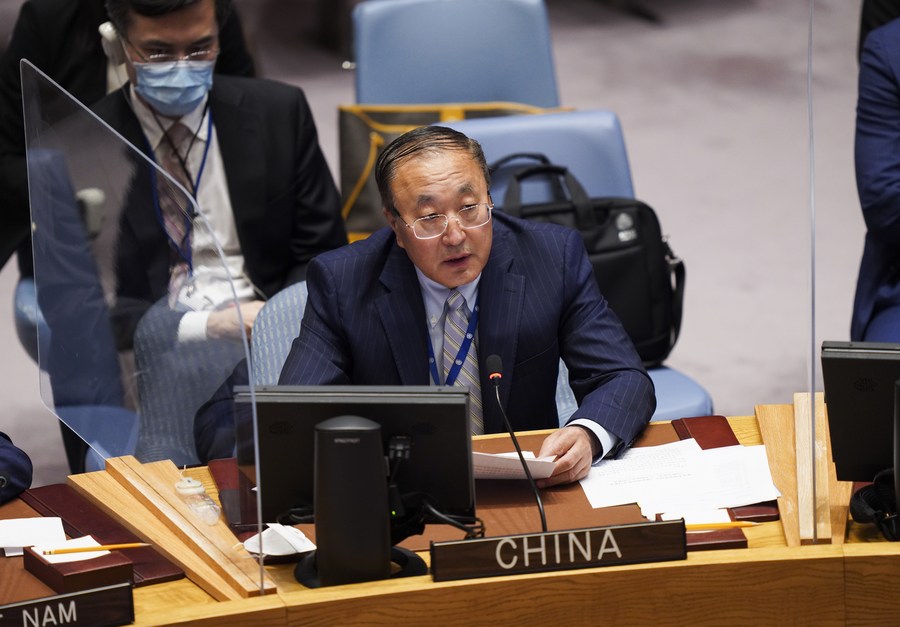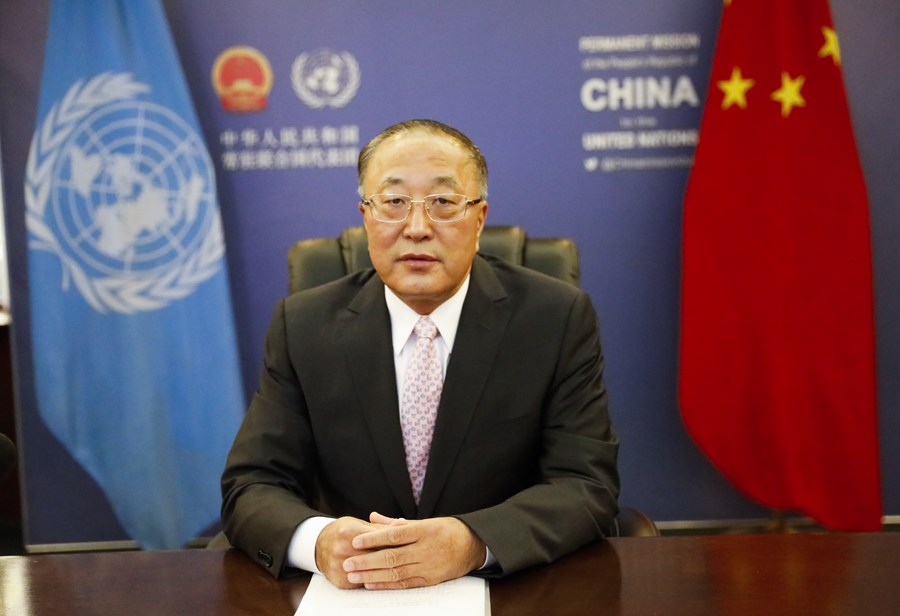Chinese envoy calls for quiet diplomacy on Ukraine

Zhang Jun, China's permanent representative to the United Nations, speaks at a Security Council high-level open debate on climate and security at the UN headquarters in New York, Sept. 23, 2021. (Xinhua/Wang Ying)
The United States, Ukraine and relevant European countries as well as NATO are having varying forms of diplomatic contacts with Russia. The parties concerned should persist in seeking to resolve their differences through dialogue and negotiations. What is urgently needed now is quiet diplomacy, not megaphone diplomacy, a Chinese envoy said.
UNITED NATIONS, Jan. 31 (Xinhua) -- China's UN ambassador on Monday called for quiet diplomacy instead of megaphone diplomacy on the tensions between Russia and Ukraine.
In a procedural vote, China and Russia voted against a Security Council open meeting on Ukraine. The meeting went ahead as 10 other members of the council voted in favor.
China opposes the Security Council's holding of such a meeting as requested by the United States. The United States, in a letter to the president of the Security Council dated Jan. 27, claimed that Russia's deployment of troops on the border with Ukraine posed a threat to international peace and security. China cannot agree with such a claim, said Zhang Jun, China's permanent representative to the United Nations.
"Recently, there have indeed been tensions over the issue of Ukraine. We are paying attention to what exactly is causing the tensions. Some countries led by the United States have claimed that there is a looming war in Ukraine. Russia has repeatedly stated that it has no plans to launch any military action. And Ukraine has made it clear that it does not need a war. Under such circumstances, what is the basis for the countries concerned to insist that there would be a war?" he asked.
The United States, Ukraine and relevant European countries as well as NATO are having varying forms of diplomatic contacts with Russia. The parties concerned should persist in seeking to resolve their differences through dialogue and negotiations. What is urgently needed now is quiet diplomacy, not megaphone diplomacy, he said.
This is the view held by many members of the Security Council, which have also made relentless efforts toward this end. Regrettably, the United States did not accept such a constructive proposal. At a time when dialogue and negotiations are under way, and concrete progress has yet to be made, the holding of such an open meeting by the Security Council is clearly not conducive to creating a favorable environment for dialogue and negotiations, nor is it conducive to defusing the tensions, said Zhang.

Zhang Jun, China's permanent representative to the UN, speaks via video link at the Third Committee of the 76th session of the United Nations (UN) General Assembly, in New York, Oct. 21, 2021. (China Mission to the UN/Handout via Xinhua)
"China once again calls on all parties concerned to remain calm, not to do anything to aggravate tensions or hype up the crisis, and to properly resolve their differences through consultations on an equal footing on the basis of mutual respect and fully taking into account each other's legitimate security concerns," he said.
China's position on Ukraine is consistent. To resolve this issue, there is a need to return to the original point of implementing the new Minsk Agreement. This agreement, endorsed by the Security Council in its Resolution 2202, is a binding foundational political document recognized by all parties and should be effectively implemented. China supports all efforts in line with the direction and spirit of this agreement, and hopes that all parties concerned will show their positive willingness to implement the agreement, resolve their differences arising from the implementation of the agreement through consultations, and earnestly promote its implementation, he said.
The expansion of NATO is a problem difficult to circumvent in handling the current tension. NATO is the product of the Cold War, and NATO expansion epitomizes bloc politics, said Zhang.
"We believe that the security of one country should not be achieved at the expense of the security of other countries. Still less should regional security rely on strengthening or even expanding military blocs. Today in the 21st century, all parties should completely abandon the Cold War mentality and come up with a balanced, effective and sustainable European security mechanism through negotiations, with Russia's legitimate security concerns being taken seriously and addressed," he said.
Photos
Related Stories
- Biden, Zelensky discuss Ukraine tensions over phone
- Chinese FM, U.S. secretary of state hold phone conversation over China-U.S. relations, Ukraine situation
- What are related parties calculating amid massive military buildup regarding Ukraine?
- Kremlin says U.S. actions escalate tensions around Ukraine
- Ukrainian president, U.S. secretary of state discuss security situation around Ukraine
- Russian troops to stay near Ukrainian border amid NATO pressure: Kremlin
Copyright © 2022 People's Daily Online. All Rights Reserved.










